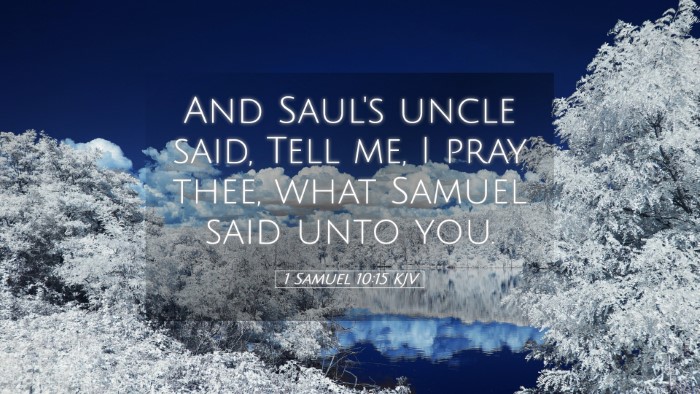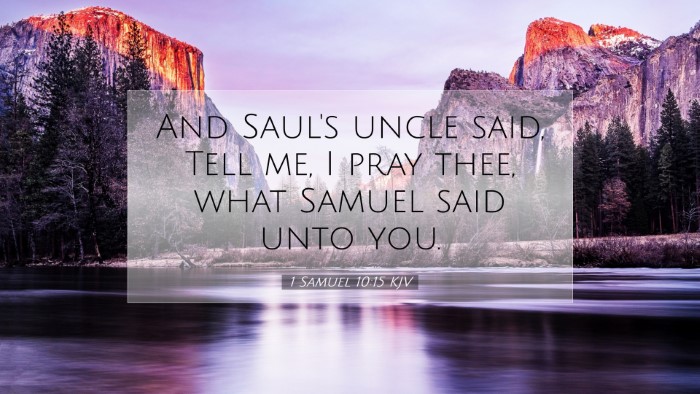Commentary on 1 Samuel 10:15
Verse Context: 1 Samuel 10:15 states, “And Samuel said unto Saul, 'Thou shalt see me no more until the day that thou shalt die.'” This verse is a pivotal moment in the narrative of Saul's kingship and highlights the prophetic role of Samuel as well as the profound implications of Saul's disobedience.
Overview of the Passage
This crucial verse occurs in a context where Saul has been anointed as king over Israel. The chapter portrays Samuel's instructions to Saul and the initiation of his kingship. It captures a transitional moment not just for Saul but also for Israel as a nation. A key aspect of this verse is its foreboding nature regarding the relationship between Samuel and Saul.
Insights from Public Domain Commentaries
Matthew Henry's Commentary
Matthew Henry highlights that this moment signifies a break between Samuel and Saul. He emphasizes the prophet's role as a mediator and guide for the king, suggesting that Saul's actions would ultimately lead to divine judgment.
- Theological Implications: Henry posits that Samuel’s separation from Saul is a sign of God’s displeasure and serves as a warning against disobedience.
- Saul's Missteps: Henry outlines Saul’s soon-to-come failures as king, suggesting that his lack of reliance on God and prophetic guidance leads to tragic consequences.
- Isolation of Leadership: The commentary reflects on the loneliness that comes with leadership, especially when one strays from divine counsel.
Albert Barnes' Commentary
Albert Barnes provides a detailed exposition of the prophetic implications of Samuel's declaration. He interprets the phrase "Thou shalt see me no more" as a significant turning point in Saul’s reign, indicative of the withdrawal of divine favor and guidance.
- Prophetic Warning: Barnes notes that this message serves as a prophetic warning to Saul about the consequences of his actions. The absence of Samuel signifies a disconnect from God’s will.
- Fate of Saul: Barnes reflects on the ultimate fate of Saul, stating that he would seek out guidance from Samuel when in distress but would never receive it again.
- Spiritual Leadership: The commentary elucidates the weight of the spiritual leadership role, emphasizing the necessity of aligning oneself with divine instructions.
Adam Clarke's Commentary
Adam Clarke approaches the verse by examining the broader narrative context and the historical implications. He shares insights on the dynamics of Saul’s kingship and the prophetic ministry of Samuel.
- Historical Context: Clarke emphasizes the historical significance of this moment as it delineates a change in God’s plan for Israel, signifying divine judgment.
- Saul's Future: Clarke underscores the inevitability of Saul’s downfall stemming from his impending disobedience. He notes that Saul would eventually seek counsel from mediums, reflecting a tragic departure from divine guidance.
- Lesson for Leaders: Clarke draws practical implications regarding the importance of humility and submission to God in leadership roles, warning leaders against the perils of pride and self-reliance.
Thematic Reflections
Reflecting upon the combined insights of these esteemed commentators, we derive several key themes from 1 Samuel 10:15 that are particularly relevant for pastors, theologians, and scholars today.
- Divine Judgement: The warning conveyed through this verse is applicable to all who seek to lead in any capacity. It emphasizes the seriousness of adhering to God’s directives.
- Role of Prophecy: This passage illustrates the vital role prophecy plays in guiding leaders and highlights the necessity of prophetic voices within the church today.
- Leadership and Accountability: Saul’s relationship with God serves as a reminder that leaders are accountable to God for their decisions and actions. The abandonment of divine counsel leads to dire consequences.
- Isolation in Leadership: The emotional toll of leadership and the potential for isolation when one strays from God’s path is poignantly depicted in Saul's story.
Conclusion
1 Samuel 10:15 is a powerful passage that serves as a cautionary tale regarding the importance of obedience to God for those in leadership. The insights offered by Matthew Henry, Albert Barnes, and Adam Clarke provide a rich tapestry of understanding that underscores the enduring relevance of this scripture. As leaders navigate their roles, they must remain vigilant and seek God’s guidance to avoid the pitfalls exemplified by Saul’s tragic trajectory.


